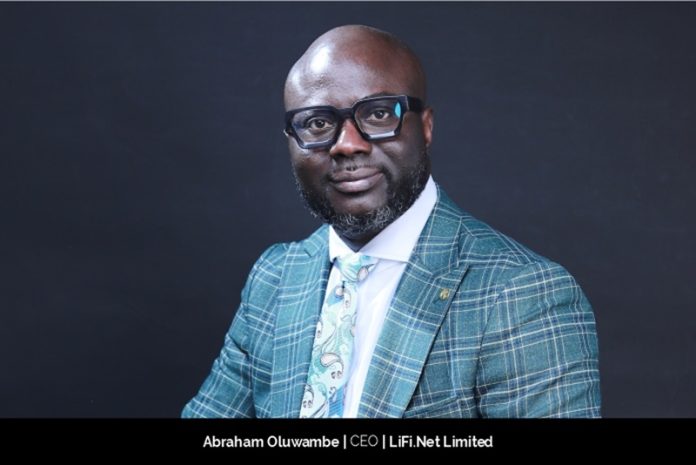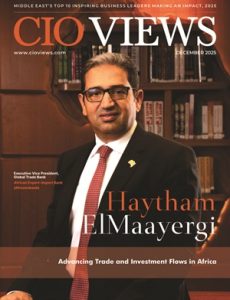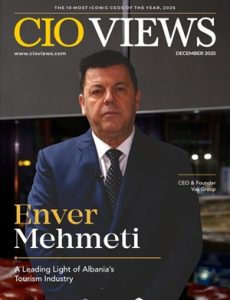Abraham Oluwambe’s journey to becoming CEO of LiFi.Net Limited is as unconventional as it is inspiring. He took a leap into the unknown, learned to fly, and successfully fixed a problem outside his expertise and comfort zone. From nothing, he has built Africa’s leading network company.
After running a successful catering service for 11 years, he took up the challenge of providing reliable internet connections to financial institutions – a new business where he had no prior expertise. However, Abraham possessed the secret ingredients needed to thrive in uncharted territory: the guts to try something new, the smarts to learn fast, and the heart to put clients first. With his bold leap of faith into the network solutions industry, he has revolutionized connectivity not only in his home country Nigeria but also across Africa.
Driven by an innovative spirit, Abraham dreams up new ideas every day, constantly seeking unique approaches that set LiFi.Net apart from the competition.
The Professional Journey: From Hospitality to Network Solutions
Prior to stepping into the network solutions arena, Abraham was “happily” running a successful hospitality business, which catered to organizations such as the Institute of Chartered Accountants of Nigeria, the Chartered Institute of Taxation of Nigeria, the Department for Foreign & International Development under Coffey Nigeria, as well as banks and insurance companies. He says, “Little did I know I was also cooking up my next big venture!”
While serving his clients, he noted that all of them were facing one common issue: “constant network outages which led to no internet to process payment.” Abraham says, “These folks needed reliable internet like I needed my secret recipe for jollof rice.” And just like that, his mind started cooking up a new idea – what if he could provide a solution to this persistent problem? So, he reached out to a major internet company and said, “Hey, let’s team up and solve this.”
“They were game, and we cooked up a plan,” Abraham recalls. He took a massive leap of faith – borrowed 6.2 million Naira and pitched his plan to big organizations. He said to them, “Give me a month. If there’s even a hint of an outage, you can walk away without any obligation. But if we nail it, you’re signing that contract!”
Abraham sent out 86 proposals but received not a single reply. He was very close to throwing in the towel and returning the loan. But two days before returning the funds then, an unexpected event – a thunderstorm hit. Abraham recalls, “It knocked out networks all over.”
A few days later, The Department for Foreign and International Development contacted him and said: “We received your proposal. If you can give us connectivity within two days, you have yourself a contract!” This became Abraham and his team’s first breakthrough, followed closely by a contract with the Chartered Institute of Taxation. “We soon reached out to others and, we were in business,” he says. “So here I am, running a network solutions company.”
Looking back, Abraham says, “Life has a funny way of nudging you onto paths you never expected.”
Running LiFi.Net Is Like Surfing
“Running LiFi.Net is like surfing,” Abraham says. “Some days the waves are perfect, other days they’re trying to knock you off your board.”
He and his team have built the company like a living, breathing organism. So, they are always on their toes, thinking, “What could go wrong next?” And then they solve it before it happens. This approach has earned them a reputation for being remarkably adept at what they do. “We’re simply prepared, having solutions ready for problems that haven’t yet surfaced,” Abraham says. “It’s not about predicting the future, but about being ready for whatever it might bring.”
For them, one of their most significant challenges was tackling latency issues, particularly for their younger clients engaged in online gaming and content streaming. Abraham shares that they realized that having servers located far from their clients in Nigeria was impacting their experience negatively. Instead of accepting this limitation, they saw an opportunity to innovate. Through strategic partnerships with Workonline Communication, they expanded their Data Centre presence to six different countries: New York, London, Hong Kong, Amsterdam, South Africa, and Nigeria.
This global network dramatically improved latency and enhanced security. Now, their clients can enjoy near-instantaneous connections to their desired content, regardless of its origin. Abraham points out that this solution not only resolved the immediate issue but also elevated the overall user experience for all their clients.
“We’re not just a tech company; we’re problem solvers,” he adds. “And there’s nothing more satisfying than cracking a tough problem and seeing our solutions make a real difference.”
Another major challenge they faced was financing expansion. Abraham explains that the Nigerian financial landscape primarily offers short-term loans, which are ill-suited for long-term fiber projects. Rather than compromising their vision with mismatched financing, they adopted a self-sustaining growth model. Abraham and his team made the bold decision to reinvest at least 80% of their total income back into the business. “This approach, while challenging, has been our secret to sustainable growth over the years,” he says. “It’s a testament to our commitment to long-term success over short-term gains.”
Abraham does not consider technical or financial problem a major challenge. For him, it is being ready for the unexpected. As he often says, “Sometimes you don’t even have to do anything wrong for things to go wrong. Things just happen.” He points out that is when leadership really matters. “It’s about keeping your cool when everything’s heating up, and guiding your team through the storm,” he says.
“Every day brings a new challenge from daily client interactions to major technical hurdles, but that’s what gets me out of bed in the morning.” Abraham adds.
Quality and Affordability
In the network solutions industry, the equipment one chooses can make or break a company. So, from day one, Abraham made a conscious decision to go for the absolute best in the market. “Sure, it wasn’t the cheapest route, but we knew it would pay off in the long run,” he says.
The team at LiFi.Net doesn’t just buy high-end equipment and call it a day; they also partner with the manufacturers to get proper training for their staff. Abraham points out that sometimes, they even reach out to industry leaders who are already using the same equipment and bring them on board as consultants. They help train their team and share their expertise.
For example, for fiber laying, they reached out to a company in London to design the fiber network based on our location map. Abraham explains that it is because they wanted to get it right from the start. They then had local engineers implement this design; now they have built up enough expertise to handle most designs in-house. However, LiFi.Net still consults international experts for particularly complex projects.
Under Abraham’s exemplary leadership, the team is always innovating. “Sometimes we need to get creative, combining different equipment to achieve the results we’re after,” he says. “It’s all about exceeding expectations.”
When LiFi.Net was founded, it was not the cheapest option available. Initially, Abraham and his team were not even thinking about profit; their focus was entirely on customer satisfaction. “It was a gamble, but it paid off,” he says. “Today, we can offer some of the most competitive prices in the market while maintaining top-tier quality.” He also informs that 90% of their clients are extremely happy with the company’s service, and for the remaining few, they are constantly working on solutions.
“We’re still investing heavily in the business,” Abraham says. “The difference is, now we’re reaping the rewards of all that initial hard work and investment, while still maintaining our commitment to quality and innovation.”
A CEO’s Responsibilities and Leadership Style
As CEO, Abraham has his finger on the pulse of everything happening in the company. He makes all the big corporate decisions. “I’m actively involved in all decisions, big and small,” he shares. Abraham also works closely with all the department heads of the company. One of his biggest responsibilities is shaping the company culture. Abraham points out, “We’re different, and I make sure everyone knows it! When I say different, I mean in how we think, how we operate, and especially how we treat our customers.”
For example, the company’s commitment to resolving an issue within five minutes. If it does not happen, it goes to the department head, and if it is still not fixed in 30 minutes, it lands on Abraham’s desk. “No customer is left hanging – that’s just how we do things,” Abraham says.
As a leader, he does not believe in prioritizing duties. “Well, in this industry, you’ve got to be flexible,” he says. Sure, he starts each day with a plan, but if something needs immediate attention, that becomes the priority for him.
Abraham, along with his team, also tracks the company’s performance every month – some of the metrics tracked are new customers, sales targets, the works. And if a team needs a boost, he is there to support and motivate them.
Abraham highlights that he is surrounded by a fantastic team, and together, they ensure excellent service delivery every single day. “It’s not just about managing – it’s about leading by example and being ready to adapt when needed,” he adds. Abraham is not a CEO who likes to sit in his office; he is right there with his team when needed. “I share my own failures and successes, showing them that nothing is impossible,” he says.
He also gives his team room to make mistakes and learn from them, treating everyone as important, regardless of their level. Abraham believes in celebrating both small and big wins – sometimes through a simple team lunch, and other times by offering more formal rewards. He credits his incredible team as the real secret to the company’s success. According to him, they go above and beyond without complaining, and that makes all the difference.
As CEO, Abraham has created a positive environment where everyone believes in the company’s unique approach. “We have a culture of getting things done, and we live by this principle daily,” he says. “When our team sees me embodying this culture, it naturally inspires them to excel.”
A happy client makes Abraham’s day. “When they say things like, ‘You guys are doing a fantastic job!’ or ‘We’re so happy with everything!’ – that kind of feedback just puts a huge smile on my face,” he says.
Trends in Network Technology Space
Abraham is particularly excited about three key network technology trends. First, the shift from physical SIM cards to eSIMs, especially in Africa. He expects this transition to improve connectivity and data access dramatically. Another trend Abraham is enthusiastic about is the explosive growth of data centers to support cloud services and AI technologies. “As businesses move online and AI applications become mainstream, the demand for robust data infrastructure is skyrocketing,” he points out.
Lastly, Abraham highlights the emergence of generative AI and machine learning, which is transforming how people work and live. He says that these technologies require significant data processing power and reliable connectivity.
To meet the rapidly evolving needs, LiFi.Net is positioning itself strategically. Abraham and his team recognize that these advancements will require not just more data, but also more efficient and powerful network solutions. “By staying ahead of these trends, we’re ready to provide the necessary infrastructure when demand peaks,” he says.
Their focus is on being solution-ready for the future of technology, where cloud services, AI, and high-speed connectivity converge. As traditional physical structures give way to digital solutions, LiFi.Net is committed to providing the robust network backbone needed for this technological evolution, says Abraham.
Impacting the Future of Africa’s Internet Connectivity
Abraham notes that there is still a lot of work to be done in Africa, as many places still do not have reliable internet. They want to be major players in changing that, both in Nigeria and other African countries.
Their plan for areas already connected is to boost things up. “We’re talking about getting home users up to 1Gbps – that’s 1000 Mbps – and offices up to 10 Gbps connections, all for a fraction of current prices,” Abraham says.
He and his team believe that in the future, nobody should have to pay for the internet. “Sure, service providers will still get paid, but for the end user, we’re working towards making it free,” he explains. “It sounds ambitious, but that’s our vision, not just for Africa, but for other parts of the world too.”
Message to Aspiring Leaders
“Without customers, a CEO’s seat is just an empty chair,” Abraham tells aspiring leaders. “The same goes for your staff – both are absolutely crucial.” He encourages them to build empathy with both customers and staff.
He advises them to develop a customer service mindset. Abraham says every customer interaction is an opportunity to grow one’s company; so aspiring leaders need to allow customers to lead the redesign of their business.
“Feel their pulse. What do they want? How do they want it? The customer sets the tone, and that’s important,” Abraham adds. “These might sound like basic things, but they’re the foundation of effective leadership in our sector.”





